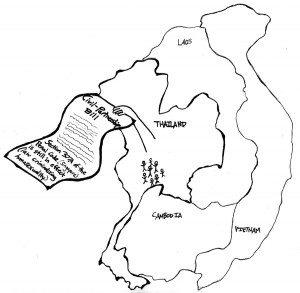Marriage equality needed in Thailand
The Thai government recently started ironing out the details of what they call the civil-partnership bill, drafted by the Parliament. The bill, according to the Wall Street Journal, will enable gay men and women to enter into a civil partnership.
The bill is expected to extend certain benefits to same-sex couples, such as shared insurance, pension and inheritance. If such a law is passed, Thailand is expected to become the first Southeast Asian nation to extend its marriage benefits to same-sex couples. Many have hailed the movement as Asia’s step towards becoming more accepting of the gay, lesbian, bisexual and transgender community.
Though Thailand’s move toward marriage equality should be commended, the international community must recognize that the East Asian region, as a whole, has a long way to go in creating a more open and accepting environment for LGBT individuals.
To many, Thailand appears to be far more open towards those in the LGBT community. The Tourism Authority of Thailand has dedicated a segment of its website, titled “Go Thai. Be Free” to promote the idea that Thai hospitality also applies to the LGBT community.
On the Tourism Authority website, they explain “Go Thai. Be Free is the slogan that we feel sums in a gay vacation in Thailand.” It appears that the Tourism Authority has only established these statements to encourage tourists from the LGBT community to visit Thailand, which in turn would boost their economy. The new trend is fostering what is dubbed “pink tourism” — and it’s expected to bring in more revenue for the Thai state.
Thus, Thailand’s intentions behind legalizing same-sex marriage are questionable. Conservative ideologies remain at large in the predominantly Buddhist state, despite Buddhist teachings that focus on compassion. Reality shows that the Thai law remains not so liberal, according to the Bangkok Post. Same-sex marriage is yet to be recognized in Thailand, and it was not until 2002 that Thai Ministry of Health declared homosexuality no longer a mental illness disorder. In addition, Thai armed forces banned those of the LGBT community from serving in the military until 2005.
Last year, the Foundation for Sexual Orientation and Gender Identity Rights and Justice interviewed 868 individuals who identified themselves as gay, lesbian or transgender throughout the nation, according to the Bangkok Post. Many of these individuals in the Thai LGBT community still feel alienated from society and discriminated against.
Fifteen percent answered that they were not accepted among their family members. Eight percent were conditionally accepted as part of their family. Nearly 3 percent were kicked out of their family homes, and 1.3 percent were forced to undergo psychological treatments. These statistics are just a snapshot of the realities that Thai men and women face today. It is clear that Thailand’s image of acceptance towards the LGBT community does not accurately demonstrate the prevailing conservative attitudes that still exist within the society.
In addition, the Thai civil-partnership bill is not without its flaws. The law would not permit same-sex couples to adopt or have custody of a child as a couple. So, one partner must file to adopt or have custody for a child instead.
On a broader note, focusing only on the Thai society prevents individuals from assessing the little progress Asia has made as a region. To this day, according to the Economist, Singapore has one of the harshest laws against homosexuality, criminalizing sexual acts between men in private or public.
And though the law itself is not actually enforced, the government has upheld the statute even after gay men challenged its constitutionality in 2007. Conservative sentiments remain prevalent in Malaysia and Indonesia as well. The Malaysian education ministry distributed guidelines to help parents notice homosexuality “symptoms” in their children. Pew Research has also found that 93 percent of Indonesians surveyed believed that LGBT “should not be accepted.”
Despite Thailand’s small steps to making legislation that would provide equal benefits for same-sex couples, its neighboring states continue to demonstrate less than accepting attitude towards homosexuals.
Though the Thai government has made significant progress in bringing forth the civil-partnership bill to the platform, over-glorifying the deed might blur the reality of the treatment of individuals in the Asian region.
Shoko Oda is a junior majoring in East Asian studies and international relations.

